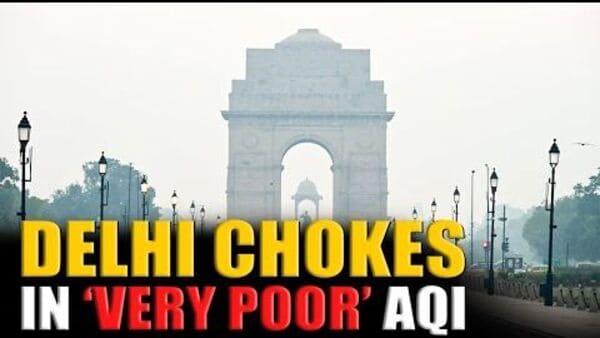
Delhi Chokes Again, 2 Weeks After Diwali: AQI Soars To 421, Air Quality Of Capital City Turns 'Severe'
The spike marks a sharp escalation in pollution levels across Delhi within 24 hours.
As smoke engulfs city skies and fog reduces visibility across the city, the air quality at AIIMS Delhi and surrounding areas was recorded as being in the 'severe' category, at 421, on Sunday.
Also Read | 'Leave Delhi if you can': Top pulmonologist advises as pollution chokes cityAccording to the India Meteorological Department (IMD), shallow fog mixed with smoke prevailed over both stations. An IMD weather expert noted that the reduced visibility was due to the combined effect of smoke and fog.
According to the Central Pollution Control Board (CPCB) data, several monitoring stations across the capital recorded air quality in the 'Severe' range, while some areas continued to report 'Very Poor' levels.
At 8 am, the AQI at key monitoring locations stood at Anand Vihar (298), Alipur (258), Ashok Vihar (404), Chandni Chowk (414), Dwarka Sector-8 (407), ITO (312), Mandir Marg (367), Okhla Phase-2 (382), Patparganj (378), Punjabi Bagh (403), RK Puram (421), Lodhi Road (364), Rohini (415), and Sirifort (403).
Most of these readings placed the city firmly in the 'Severe' or 'Very Poor' categories.
Since Diwali, the Delhi-NCR AQI has been categorised as 'poor' and 'very poor' in several areas, even as Stage 2 of the Graded Response Action Plan (GRAP) remains in effect.
Also Read | Never smoked? You can still get lung cancer, warns pulmonologist 15% of deaths in Delhi in 2023 linked to air pollutionAir pollution remains the single largest health risk for people in Delhi, accounting for nearly 15 per cent of all deaths in 2023, according to an analysis of the latest Global Burden of Disease (GBD) data.
Researchers at the Centre for Research on Energy and Clean Air (CREA), which analysed the latest GBD data, said that, despite year-to-year fluctuations, deaths attributable to particulate matter pollution have remained persistently high, often exceeding those linked to hypertension or diabetes.
"Air pollution is not just an environmental issue; it is a public health crisis that demands science-based action across polluting sectors to achieve real and measurable pollution reduction," said Manoj Kumar, analyst at CREA.
"Unless Delhi's air quality improves substantially, the health burden from pollution-related diseases, especially respiratory illnesses, heart disease, stroke and lung cancer will continue to rise," he added.
The data shows that deaths linked to air pollution rose from 15,786 in 2018 to 17,188 in 2023. This means one in every seven deaths in the city was linked to polluted air.
Also Read | Delhi: 17,188 deaths linked to air pollution in 2023, says reportHowever, Union Minister of State for Environment Kirti Vardhan Singh told the Rajya Sabha that while air pollution is certainly a concern, isolating it as the sole cause of mortality is not scientifically accurate.
“Health is determined by several variables, including food habits, occupational exposure, socio-economic conditions, medical history, immunity, heredity and environmental factors,” he said.
(With agency inputs)
Legal Disclaimer:
MENAFN provides the
information “as is” without warranty of any kind. We do not accept
any responsibility or liability for the accuracy, content, images,
videos, licenses, completeness, legality, or reliability of the information
contained in this article. If you have any complaints or copyright
issues related to this article, kindly contact the provider above.


















Comments
No comment